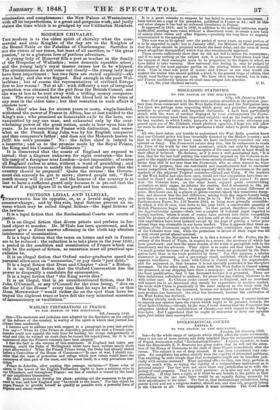MISLEADING STATISTICS.
TO THE EDITOR OF THE SPECTATOR.
Cle#, 4th January 1848. Sne—Few questions seem to deserve more serious attention at the present junc- ture than those connected with the West India Colonies and the Navigation-laws. Yet there are perhaps none respecting which party and prejudice more eagerly interfere to prevent calm and impartial discussion. I have been particularly struck with the want of candour displayed by your contemporary the Econo- mist in commenting upon these important subjects: and as the leading article in his last number, to which I refer, purports to be a reply to same strictures you passed upon one of Mr. Cobden's recent platform speeches, I hope you will allow me room to draw attention to a few specimens I shall select to prove this allega- tion.
All who have taken any trouble to understand the West India question know that our Colonial policy has been invariably dictated by the Mother-country; and that in all the changes we have made we have exclusively consulted our own interest or fancy. The Economist cannot deoy this; but he endeavours to evade the force of the truth by two bold assertions, which can only be designed to mislead his readers into a gross misconception of the case—such at least would be their effect if believed. He declares, as if it were a well-ascertained fact, "It is true, that for the last half century the restrictions imposed on the Colonies in re- gard to the supply of manufactures have been entirely nominal." But who can know better that this is not true than the Economist, who so often assured us, when it suited his purpose, that our merchants and manufacturers had to encounter severe competition with foreigners, and especially with the Americans, in the open markets of the adjacent Tropical countries—Brazil and Cuba. If the markets of the West Indies had also been open, would not that competition have been ex- tended to them? and what does competition mean but lower prices? To prove that the Colonies have, on the other hand, enjoyed great countervailing protee„tion on their sugar, he informs his readers, that it amounted to 381. per hundredweight; leading them to: suppose that this was the actuid difference of price. Merchants can, by a glance at prices-current, check this monstrous decep- tion, and discover that the real difference, arising froth Abe export-bounty being more than a mere drawback, varied froni 2s. to 7s. But 'I invite attention to a Parliamentary Paper, No. 153 Session 1844, as being more generally accessible: by which it will be seen, that down to the year 1839, a considerable quantity of British Plantation Sugar was exported. To that period, therefore—the close of the Apprenticeship system—there was a surplus of Colonial sugar exported to foreign markets, where it must of course have entered into direct competition with the produce of other countries, and been sold at the same price. Nor could this exportation have been induced except by the hope of getting a better price abroad than was obtainable in our home market. Thus it appears that these as- sertions of the Economist ought to be reversed—the restrictions upon the trade of the Colonies were real, while the protection in favour of their sugar was till a very recent period almost nominal. The article on the Navigation, laws is in fact a defence of Mr. Porter, the Se- cretary of the Board of Trade, in respect to a return, the accuracy" of which has been questioned: and here the same evasion of the truth is perceptible both in the functionary and his advocate. Their object is to make out that there has been "a much greater increase of our shipping in the trade not protected by the Navi- gation-laws than in the trade protected by them." For this purpose, a tabular statement is presented, and a percentage result exhibited, which at first sight appears conclusive. The trade with China is classed among the unprotected; and the argument is, that because it is not specially protected it has therefore increased. On the other hand, the trade with the West Indies is classed among the protected, as our shipping have there a monopoly; and it is inferred, without the least qualification, that it has decreased because it is protected. These are false deductions, calculated to mislead; for protection has nothing whatever to do with either case. As Chinese junks cannot come to England, and no merchant will import tea in an American ship merely for exportation to another market, the trade with China is practically in the same category as the trade with the West Indies. The one has increaeed, because our demand for tea and other Chi- nese produce has increased; the other has decreased, because the cultivation of the West Indies has declined. "
Having already made so large a claim upon your indulgence, I cannot venture to express any opinion upon the course which ought to be pursued towards the West India Colonies,—though, by the way, I must observe that the Economist has altogether blinked the consideration of slavery,—or with regard to the Naviga- tion-laws. But I apprehend that we ought to endeavour to form our opinions


























 Previous page
Previous page